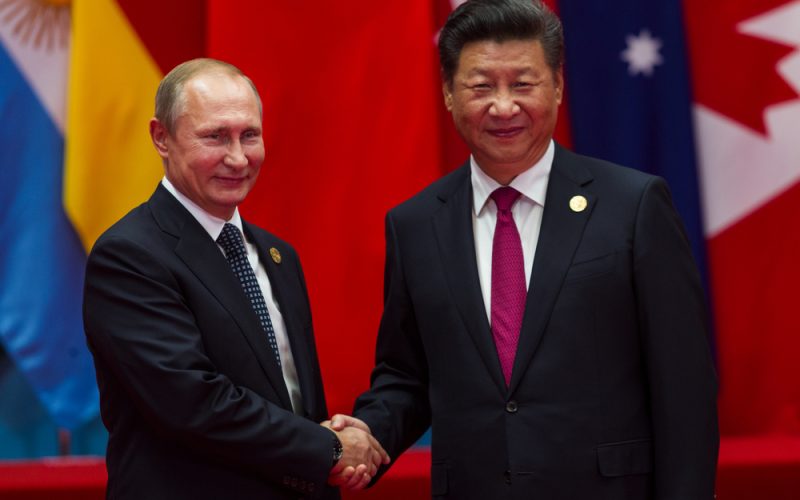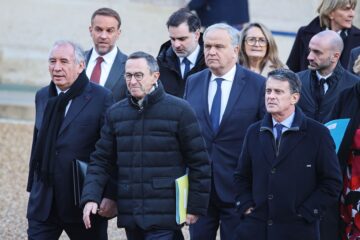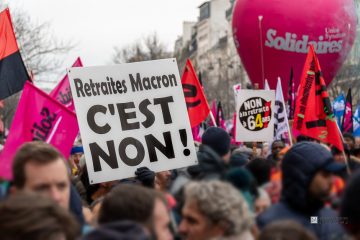Written by : Dr. Pratip Chattopadhyay
Photo : Shutterstock.com
Summary:
With the meeting of Chinese President Xi Jingpin and with his Russian counterpart Vladimir Putin in March 2023, observers on international politics are surfacing two opposite viewpoints – one is about collaborative cooperation against United States of America and another is about maintaining the balance in world politics – building a non—US axis in world politics. Amidst this two contrasting viewpoints, this article claims that the engagement is a long standing one aimed at primarily mutual economic benefit having other ancillary political benefits emerging out of the bonhomie. Russia is trying to have foreign revenues for continuing the war all alone on one front and China with its capitalism with Chinese characteristics aims to accrue profit in any situation of peace and war through engagements.
This short commentary is divided into three sections – background of the engagement, outcome of the engagement and consequences of the engagement. This piece concludes by arguing that China and Russia are playing a lonely geopolitical battle in their own backyard and to continue them both need resources from the other in whatever form from standing together to laying new value-order dictum.
Background of the Engagement:
Friendly cooperation between China-Russia has a solid political, economic, and cultural foundation. Consolidating and deepening the China-Russia comprehensive strategic partnership in the new era is in the fundamental interests of the two countries’ peoples. It is conducive to world peace and stability, and is a positive global asset. China pursues an independent foreign policy focused on peace. It is unreasonable to think that Xi’s visit to Russia is about “choosing sides.” His visit is a normal exchange between two sovereign countries and will not be affected by the complicated international situation. Western politicians need to look beyond their ideology before they criticize. Regarding the Ukrainian crisis, observers who follow China’s diplomacy know that China has recently put forward the “Concept Paper on Global Security Initiatives” and “China’s Position on the Political Solution to the Ukrainian Crisis.” From concept to practice, it reflects a consistent position of promoting peace through peace talks. China looks to Russia as a source of oil and gas for its energy-hungry economy, and as a partner in standing up to what both see as U.S. aggression, domination of global affairs and unfair punishment for their human rights records. China’s foreign policy reflects the aspirations of the vast number of developing countries and peace- loving people in the world. It has been positively evaluated by countries and organizations including Russia and Ukraine. It is the most practical and effective peace plan at present.
In an article published in the Chinese People’s Daily newspaper, Putin described Xi’s visit as a “landmark event” that “reaffirms the special nature of the Russia-China partnership” and said the meeting signalled that the two countries aren’t prepared to accept attempts to weaken them. The growing economic dependence of Russia on Beijing is reflected with China now accounting for more than 40% of Russia’s total imports, according to the state trade data.
Data shows that China has stepped in to supply Russia with large volumes of products for both civilian and military use, including raw materials and computer chips – vital resources for Moscow to keep its war machine afloat. Chinese imports of Russian oil increased by 8% last year. This shift partly explains why the Russian economy has fared better than many economists have predicted after the introduction of unprecedented western sanctions on the country.
Outcome of the Engagement:
The meetings yielded no breakthrough on resolving the conflict in Ukraine. Both leaders called for the cessation of actions that “increase tensions” and “prolong” the war in Ukraine, according to their joint statement released by China’s Foreign Ministry. The statement did not acknowledge that Russia’s invasion and military assault were the cause of ongoing violence and the humanitarian crisis in Ukraine. The leaders called for promoting a “multipolar world” – a buzzword for a system not led by so-called Western values and rules, and pledged to work together to “safeguard the international system,” and the United Nations – where the two have a track record of blocking motions, including against actors like North Korea. Russia and China pledged to “further deepen military mutual trust,” citing strengthening their military exchanges and cooperation and regularly organizing joint maritime and aerial patrols.
The joint statement did mention working together to promote “research and consultation” related to a “new China-Mongolia-Russia natural gas pipeline project.” The Beijing-Moscow joint statements caught market attention because bilateral trade was projected to rise by more than 30 per cent to surpass US$200 billion this year. More energy cooperation is planned before 2030 and both agreed to work together in areas of technology where they are being strangled by the US. The outcome of the engagement is a mutual give and take position with a common aim to create a narrative of anti-US world order. Mostly economic in nature, the benefit that is generated from Xi Jingping’s visit to Russia turned out to be significant geopolitically as even Asia is seen as a divided house with Japan siding with Ukraine in tandem with the spirit of QUAD of free and peaceful order and China siding with Russia to create a dominant counter-hegemonic narrative.
Consequences of the Engagement:
After Russia invaded Ukraine a year ago, Western nations imposed strict sanctions on Russia – banning imports of oil and exports of hi-tech products. Many Western firms cut their connections with Russia entirely, and its trade with the US, UK, and EU countries slumped over the course of 2022. However, China’s overall trade with Russia hit a record high level of $190bn in 2022 – a 30% increase on the year before. There are also longer term plans to expand energy ties. The two countries have agreed to build a new gas pipeline (the Power of Siberia 2). The existing one began operation in 2019, under a 30-year contract worth more than $400bn. Some analysts, however, believe Beijing is making a calculated play that serves its economic needs while searching for resolution to the Ukraine war. China’s pledge to deepen hi-tech cooperation with Russia might have ushered in a new round of geopolitical struggle among major powers, while exposing more Chinese companies to US curbs. Beijing is keeping its distance and making a calculated play, ensuring it has access to energy, grains and technology while potentially bringing Russia and Ukraine back to the negotiation table. In addition to civil aircraft construction, shipbuilding and car manufacturing, the two countries will join hands in research and artificial intelligence, the Internet of Things, 5G and the digital economy, many of which are facing bans from the US.
Putin’s motivation for the meeting is easy to explain. He is now an international pariah, but this was an opportunity for him to show that he is still accepted by the leader of the world’s second most powerful country—even if it is increasingly seen as a vassal state. Xi’s motivation is more puzzling. His embrace of Putin and deepening of ties with Russia will further damage China’s image in Europe and the free world. In an interesting juxtaposition, Japanese Prime Minister Fumio Kishida was in Kyiv at the same time. The paired visits were a poignant symbolic and substantive reminder of how Beijing and Tokyo’s current alignment choices are roughly the reverse of their World War II positions. The consequences of the meeting will be far fledged as Russia’s move towards Ukraine could be replicated by China in its backyard of South China Sea region and also in Taiwan. Chinese military analysts have scrutinized the fighting for innovations and tactics that could help in a possible clash over Taiwan, the island, democracy that Beijing wants to absorb and the United States has at times pledged to defend. China was most likely monitoring the thousands of Stinger, Javelin and other missiles that Ukraine has acquired, and weighing what would happen as Taiwan built up its stocks.
The China-Russia axis has been fledged in SCO, BRICS and UNSC platforms but their intentions, plans and joint moves are moderated by the presence of other nation-states. China is actually trying to play with Russian position because every nation-state is driven by its national interest. Russia without much gain wants China by its side in an isolated time. But any meeting between two big powers cannot simply have mutual consequences. The consequences at the world politics scale is what the conceding section will hint at.
Way Ahead:
Russia’s troubles in Ukraine appear to have hardened official Chinese views that Beijing, like Moscow, is the focus of a United States-led campaign of “hybrid warfare” that includes economic sanctions, technological bans, information campaigns and cyber attacks. Chinese military analysts have focused on the equipment and intelligence that NATO countries have provided Ukraine to help fight Russian forces.
Xi is a super grandmaster playing a deviously clever game: loudly extolling the partnership with Russia and supporting his pal now, while silently being fully willing to sacrifice both when realpolitik requires an about-face later. Such a double-cross is perfectly plausible for one simple reason: Unlike Russia, which really has no other choice but vassalage, China has many choices, of which a “consequential” alliance with Russia may be least desirable and most temporary. China is eyeing for the most powerful nation of the world spot and Russia is eyeing to spread its hegemony in East Europe or parts of erstwhile Soviet Union So China’s ambitions are much greater than Russia’s. Moreover, the Russian President needs to tackle domestic unrest and protest unlike his Chinese counterpart. In this context the meeting is neither of collaboration for alternative power bloc establishment or of balancing world political power directions. The meeting is precisely to further the national interest of both Russia and China in their own way.
(The views expressed in this article are the author’s own and do not necessarily reflect Multidimension’s editorial stance.)
About the author :
Pratip Chattopadhyay
Assistant Professor and Head, Department of Political Science, University of Kalyani, West Bengal, India




